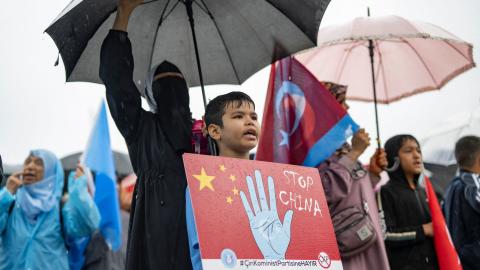Recently, the Trump administration formally notified Congress of its plans to reorganize the State Department. Plans include drastic cuts to both personnel and funding at the Bureau of Democracy, Human Rights, and Labor, the bureau at the U.S. Department of State most responsible for safeguarding freedom and human rights abroad.
Reducing bureaucracy and the size of the federal government is a worthy endeavor. Yet this announcement came amid rising threats to U.S. national security from the authoritarian governments of nations such as China, Russia, North Korea, Iran, and others. An increasingly dangerous world stage makes it all the more obvious that a restructuring which comes at the expense of a strong national defense and a robust arsenal of tools to defend human rights is not just shortsighted. It also forgets what made Ronald Reagan’s peace through strength possible.
Since Donald Trump’s second inauguration, some in the State Department have spearheaded cuts and reorganizations that have severely deemphasized human rights as an element of U.S. foreign policy. Efforts to provide life-saving aid through USAID have been temporarily stymied or face uncertain futures, critical nodes of information provided through Radio Free Asia and Radio Free Europe/Radio Free Liberty have been cut off, and civil society organizations devoted to defending human rights find themselves without government support.
During Trump’s first term, the administration’s commitment to defending religious freedom often meant that human rights were highlighted and defended. In his second term, the administration’s foresaking of human rights tools is being justified, in part, as a necessity to remove “wokeness” from the State Department. But most of the specific programs on the chopping block are not ideological in nature. Instead, Reaganite policies designed to safeguard fundamental freedoms and human rights are being cut. To the extent they have lost sight of their original mission, they need to be reformed, not eliminated.
These figures in the second Trump administration are not the first around a president to underappreciate the strategic importance of good human rights policies. Republicans and Democrats alike have too often failed to see the significance of human rights in foreign policy. In the past, this oversight has forced the U.S. to fight adversaries with one hand tied behind its back.
Some in the Trump administration are undermining the very tools and apparatus that make it possible to counter authoritarians’ disinformation, provide relief to political prisoners, counter transnational repression, offer safe haven to dissidents and freedom-loving individuals, and ultimately shift the balance of power within a country. These features had nothing to do with a “woke” agenda. Rather, many of these policies were designed to protect the kind of freedoms Americans hold most dear: freedom of speech, association, the press, religion, and more.
There need not be a conflict or even tension between serving American interests and protecting human rights. In fact, protecting these freedoms elsewhere serves American interests. U.S. policies designed to safeguard human rights serve not as a last but rather as a first line of defense against authoritarians. The utter disregard by authoritarians for the rights of their own peoples, if left unchecked, nearly always threatens American security. Thus, today, the U.S. isn’t just fighting with one arm tied behind its back. It’s as though we have lost a limb entirely.
Degrading U.S. capabilities to respond to authoritarians is not without consequences. America’s adversaries — those countries that pose the greatest threat to U.S. national security — share a common denominator: Each one violates human rights (in most cases, both domestically and abroad) to maintain power. Which is why they all hate America’s promotion of human rights: They view it, rightly, as a challenge to their nefarious designs — which depend on subjugating their own peoples.
Take China. The Chinese Communist Party is one of the gravest of threats to U.S. national security. The CCP relies on the tacit compliance of the Chinese people to ensure carte blanche approval of its agenda. The CCP’s ongoing genocide against the Uyghurs, for example, advances the CCP’s core foreign policy goals: to maintain sovereignty and safeguard internal stability. And the Uyghurs aren’t the only targets. Chinese Christians, Tibetan Buddhists, Falun Gong, and others face immeasurable persecution, as does the intelligentsia, including human rights lawyers and high-profile dissidents.
The CCP’s efforts to undermine human rights don’t stop at China’s borders. Pro-democracy activists — ones the Trump administration supported during the first term — are facing threats on U.S. soil. And their families in Hong Kong are targeted because of their advocacy here in the U.S. and abroad. The CCP feels most threatened when their citizens exercise and enjoy full human rights.
Downplaying human rights, therefore, threatens national security. It gives the CCP (and adversaries like Russia, Iran, North Korea, and others) permission to violate human rights both domestically and abroad, to undermine and threaten U.S. (and other countries’) sovereignty without consequence, and removes obstacles of resistance to policies that harm U.S. interests.
Deprioritizing human rights leaves valuable leverage on the negotiating table and concedes hard-fought ground that granted the U.S. the ability to weigh in on matters of values in the first place. U.S. victories in World War II and the Cold War granted the U.S. the authority and capacity to secure freedom for Americans and to defend freedom where it was under threat abroad. Our adversaries would love nothing more than for the world to forget about those victories and what they enabled.
Reagan understood that America at its best requires a strong national defense and robust national security apparatus, as well as a commitment to defending human rights and values at home and abroad. His idea of the U.S. as a shining city on a hill isn’t just an ideal. It’s a reality that all Americans should strive for.
What would that reality look like?
It’s not too late for the administration to change course. While there is merit in reevaluating what works and what doesn’t, increasing government efficiency, and reducing the size of government, current efforts should look for ways to strengthen, rather than undermine, tools of human rights statecraft.
The recent past provides good examples of a rightly ordered foreign policy that advances both human rights as well as U.S. interests. Again, one can even look to Trump’s first term for such examples. The first Trump administration’s prioritization of freedom of religion or belief committed U.S. leadership to defending the human rights of people of faith (and of no faith) alike. These policies didn’t just inspire action by governments. They also generated momentum through civil society after Trump’s first term ended — momentum the Biden administration could not stop and actually continued.
Another excellent example of good human rights policy is the Bush administration’s President’s Emergency Plan for AIDs relief, or PEPFAR. It has saved more than 26 million lives through its efforts to treat and prevent the spread of HIV/AIDs. PEPFAR is a U.S.-led aid triumph at providing life-saving relief. It thus also strengthens American leadership, to the bitter envy and enmity of our adversaries.
The final example is the Uyghur Forced Labor Prevention Act, or UFLPA. The act used a traditional trade tool to achieve human rights ends. Its “rebuttable presumption” stated that all goods produced with Uyghur labor are presumed to be produced with forced labor and are therefore prohibited entry into U.S. markets. As of July 2025, more than $3 billion in goods have been investigated and over $800 million in goods denied entry into the U.S. The law advances the national interest as well as human rights — an ideal template for all such policies.
All of these policies share one critical attribute: They have advanced U.S. and global interests while safeguarding and defending human rights. Future policies can and should enjoy similar success in advancing freedom and liberty domestically and abroad.
They can do so by:
- Making better use of traditional national security tools to achieve human rights ends. For example, more skillfully employing sanctions and other financial tools to increase the risk to individuals and entities of violating human rights
- Ensuring that concerns about and support for human rights are better integrated into diplomacy with our adversaries, placing premiums on securing the release of political prisoners, and elevating the voices of pro-freedom dissidents
- Striving to provide safe haven to persecuted people, especially those who are securely vetted and share beliefs about the value of human rights and good governance
- Providing access to information that equips people in closed societies with the information they need to either facilitate change from within or flee to freedom beyond their countries’ borders
- Emphasizing and expanding policies that are inherently lifesaving
U.S. policy should strive to achieve Reagan’s vision of America as a shining city on a hill. To give up on that vision is to give up on what makes America great. The future of U.S. foreign policy is brightest when we craft and implement policies that effectively advance both U.S. interests and human rights.


















